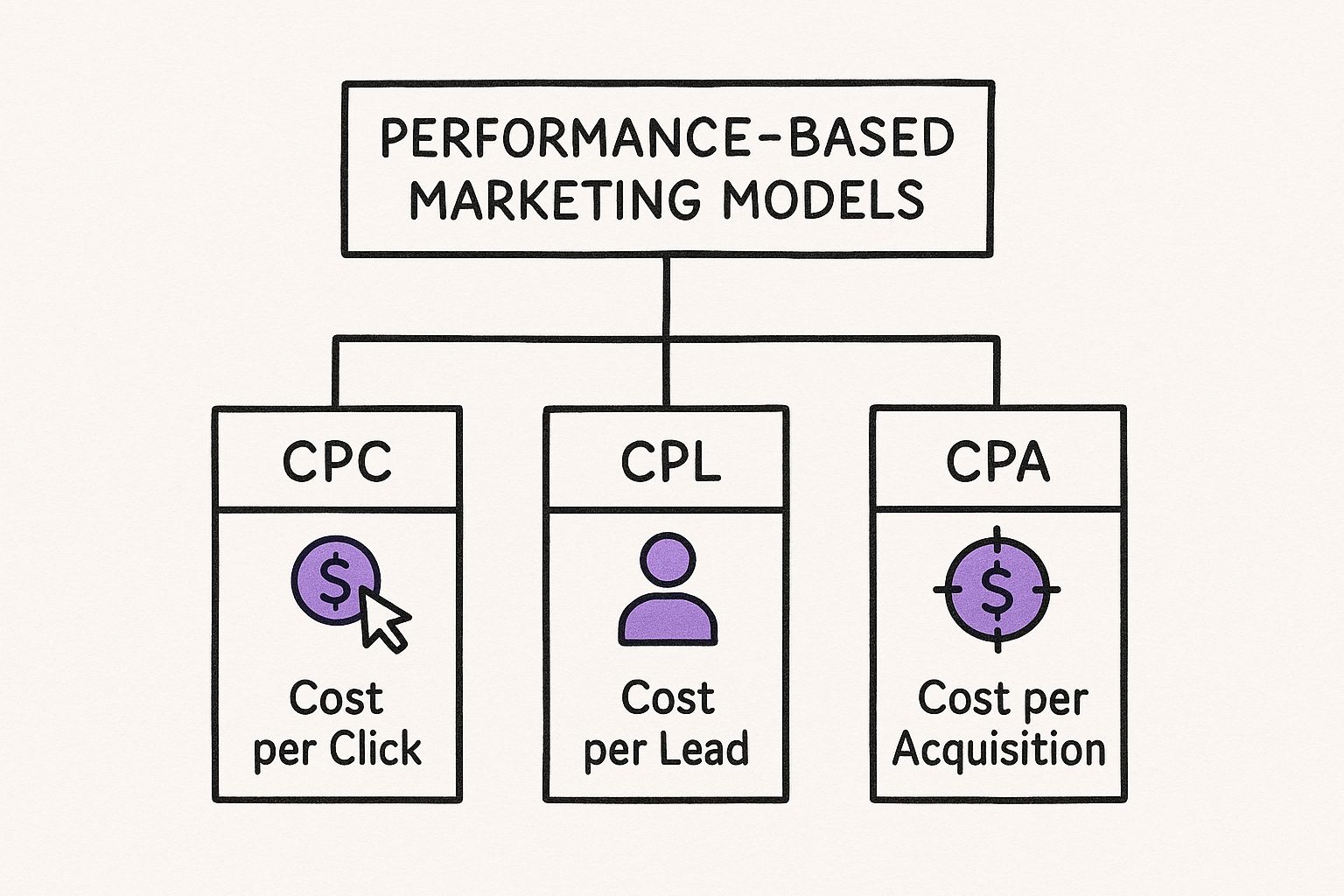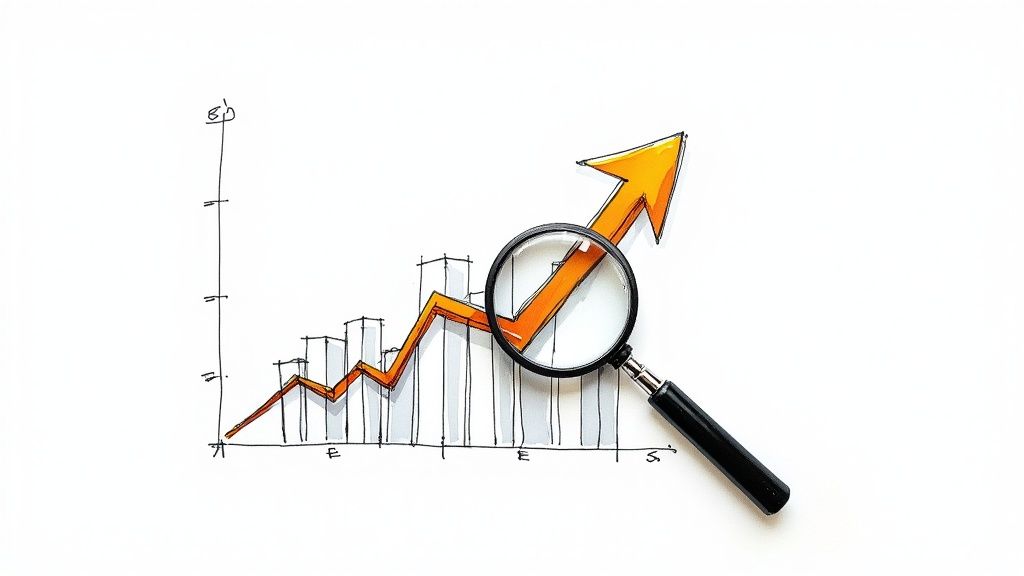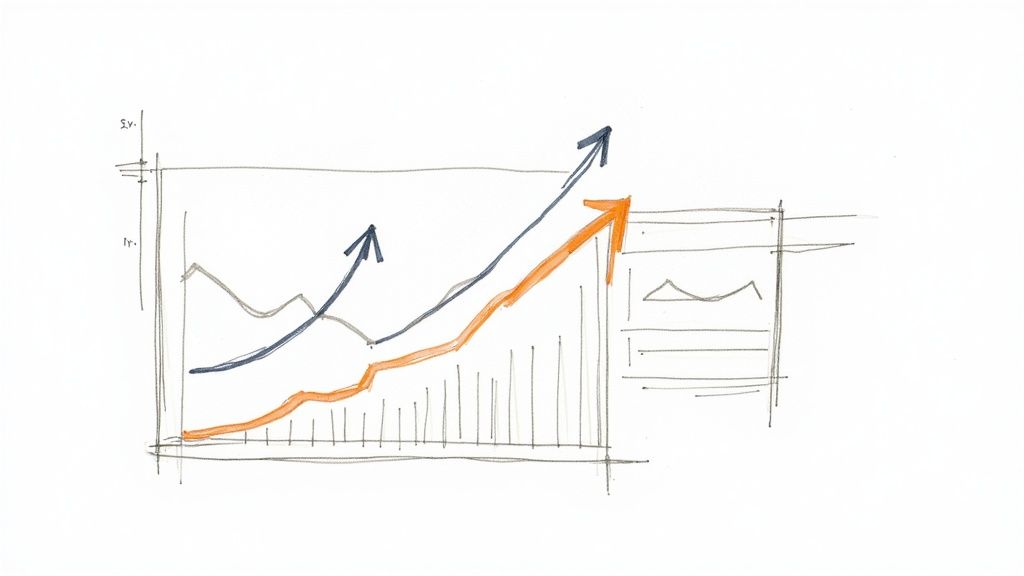
Streamline Your Workflow: The Ultimate Guide to Automated Client Reporting in 2026
Master automated client reporting in 2026. Our guide covers AI, implementation, and cost-effectiveness for agencies. Streamline your workflow today!

Picture this: you hire a sales team, but you only pay them when they actually close a deal. That’s the core concept behind a performance based marketing agency. You're no longer paying for hours worked or tasks completed; you're paying for real, tangible results like qualified leads, new customers, or sales.
A performance based marketing agency works on a straightforward, powerful premise: their success is directly linked to yours. Instead of the usual retainers or hourly billing, they make money by delivering specific, pre-agreed-upon actions. This creates a genuine partnership where the agency has real skin in the game.
The entire focus moves away from fuzzy metrics like impressions and clicks and zeroes in on what actually grows your business. It’s a model built on accountability, where every marketing dollar is tied directly to a measurable return. It's no surprise this approach is gaining traction. By 2025, global digital ad spending is expected to hit a staggering $777 billion, making it more critical than ever for businesses to partner with agencies that can prove their worth.
A great example of this model in action is the affiliate marketing ecosystem, which is built entirely on paying for performance.
To see the difference clearly, let's break down how these two agency types stack up against each other.
The table makes it clear: the performance model aligns incentives and puts the focus squarely on outcomes that matter to your bottom line.
Here are the most common payment structures you'll see a performance based marketing agency use.

Whether it’s Cost Per Click (CPC), Cost Per Lead (CPL), or Cost Per Acquisition (CPA), each model gives you the flexibility to pay only for the results that are most valuable to your business, from sparking initial interest all the way to closing the sale.

A performance-based marketing agency doesn't just run ads and hope for the best. They live and breathe data, using a specific set of tools to get you tangible results—the kind that actually grow your business. Their whole game is about moving past fuzzy metrics like "brand awareness" and focusing on actions that matter.
This means they're constantly in a cycle of testing, analyzing, and tweaking every single part of a campaign. Think of it as a relentless pursuit of perfection. They’re fine-tuning audience targeting, obsessing over landing page conversion rates, and A/B testing ad copy until they find the exact message that clicks with your customers. It’s this hands-on process that turns your marketing budget into a profit-generating engine.
Performance agencies stick to channels where every click, lead, and sale can be tracked. Why? Because that data is gold. It allows them to make smart decisions and double down on what’s actually working.
The entire industry is shifting in this direction. A recent AgencyAnalytics report on marketing agency benchmarks found that by 2025, nearly 7 in 10 agency leaders expect paid ads to become even more important, with a staggering 89% calling it their main service. This just goes to show how much businesses value seeing a clear, short-term return on their ad spend.
Of course, driving traffic is only half the battle. The best agencies also use smart systems to make sure no lead gets left behind, often using a playbook on marketing automation for agencies to build efficient funnels.
And remember, where you send that traffic matters. Your website's content management system needs to be set up to convert visitors into customers. To learn more, check out our guide on how SEO and your CMS work together to maximize results.
These days, performance marketing is less about gut feelings and clever slogans and more about science. The best performance-based marketing agencies run on data and smart technology. These tools aren't just add-ons; they are the engine driving every single campaign, turning the art of customer acquisition into a predictable science.
Think of AI as the agency's secret weapon. It sifts through mountains of data to figure out which groups of people are most likely to buy something. It also automates the tricky process of bidding for ad space, making sure you get the best price, and even helps deliver personalized ads to thousands of people at once. This approach means every move is based on solid evidence, not just a hunch.
At its heart, performance marketing is about placing smart bets. Using AI and data analytics gives an agency a massive advantage, letting them spot trends in customer behavior that a person would completely miss. This means they can make proactive changes to a campaign instead of just reacting after the fact.
AI has completely changed the game. It’s projected that businesses will spend over $217 billion on AI marketing tools by 2034, which tells you everything you need to know about where things are headed. Agencies are already building campaigns that change on the fly based on what people are doing.
Ultimately, this tech-heavy approach lets an agency fine-tune campaigns with incredible precision. If you want to get into the nuts and bolts of your own marketing setup, check out our guide on the top features your CMS should have to make these data-driven strategies possible.

At the heart of any performance-based partnership is how the agency gets paid. Forget the old-school flat-fee retainer where you pay the same amount whether you get crickets or a flood of new customers. Here, payment is tied directly to real, measurable results.
This approach flips the script. The agency only makes money when you make money (or get the leads you need). It forces them to be just as invested in your success as you are. The whole point is to find a model that mirrors what you’re trying to achieve as a business.
The beauty of performance marketing is its flexibility. You can structure the deal around different parts of your customer's journey, whether that's their first flicker of interest or the moment they pull out their credit card.
Cost Per Lead (CPL): In a CPL model, you pay a fixed price for every qualified lead the agency sends your way. Think of a home renovation company paying $50 for each person who fills out a detailed form asking for a project quote. This is perfect for businesses that need to fill their sales pipeline and have a team ready to nurture those prospects.
Cost Per Acquisition (CPA): With CPA, you don't pay for clicks or impressions—you pay for a new customer. An online store might pay their agency $25 only after a shopper completes a purchase. It's a straightforward model for anyone focused on driving immediate sales and a clear return on ad spend.
Revenue Share is the truest form of partnership. The agency takes a percentage of the actual revenue they help generate. Imagine a software company giving their agency 15% of every new subscription that comes from their campaigns. This model ties their success directly to your top-line growth.
Finding the right pricing structure is a crucial first step. A good performance marketing agency will work with you to analyze your goals and sales process to land on a model that creates a genuine win-win.
The table below summarizes the most common models and the business goals they align with.
Ultimately, the goal is to create an incentive structure where the agency is rewarded for achieving the exact outcomes that help your business thrive.
Picking a performance-based marketing agency isn't just another vendor contract; it's like bringing on a new business partner. Get it right, and you've got a powerful engine for growth. Get it wrong, and you're just burning cash. The trick is to look beyond the slick sales deck and really probe what they can do.
Start by digging into their past work. Don't just ask for case studies—ask for ones from businesses that look like yours, both in industry and in size. A long history of success in your specific niche is one of the best predictors of what they can do for you. If they're all talk and no data, that's a major red flag. You want to see hard numbers, not vague promises.
Next, get a feel for their technical skills. How do they actually track results? What tools and platforms are they using? Transparency is the name of the game here. You should have 24/7 access to a dashboard showing exactly where your money is going, with clear metrics like Return on Ad Spend (ROAS) and Cost Per Acquisition (CPA). If an agency is cagey about sharing real-time data or their reports are a jumbled mess, they might be trying to hide lackluster performance.
A great agency feels like a natural extension of your own team. They'll give you clear, honest insights and work with you on strategy, not just send a report once a month.
They should be able to walk you through precisely how they define success and what levers they'll pull to make your campaigns better over time.
Finally, assess how they think. Do they dive deep into your business goals, or are they just pushing a cookie-cutter package? A top-tier agency will build a strategy from the ground up, tailored specifically to what you want to achieve.
Technology and strategy are deeply connected. To see how this plays out on a broader scale, it's worth understanding the future of CMS and the impact it has on modern marketing efforts.

Even with all the clear upsides, it’s normal to have questions before jumping in. It’s a different way of working, and getting the details straight from the beginning helps you know if it’s the right call for your business. Let’s tackle some of the most common questions we hear.
Performance marketing really shines when your business has a clear, trackable action you want customers to take. If you have an e-commerce shop, a SaaS company chasing sign-ups, or a service business that needs a steady stream of qualified leads, this model is practically tailor-made for you.
On the other hand, if your main goal is just getting your name out there—what we’d call broad brand awareness—a more traditional marketing approach might serve you better. Any honest performance based marketing agency will tell you straight up if your business is a good fit for how they operate.
A successful partnership is a two-way street. While the agency drives the campaigns, your expertise on your ideal customer, product value, and lead quality is essential for refining strategy and achieving the best possible outcomes.
No credible agency will ever promise you an exact number. What you should expect is a measurable and positive Return on Ad Spend (ROAS). They’ll sit down with you to set realistic Key Performance Indicators (KPIs) based on your industry, past performance, and specific goals. Success here is all about transparent reporting that shows exactly what you’re paying for each lead or sale. The whole point is to map out a clear path to profitability and see steady improvement as campaigns get fine-tuned with real data.
You should think of this as a collaboration, not a complete hand-off. The agency will manage the day-to-day nuts and bolts of the campaigns, but your team’s insight is absolutely crucial. You'll be the one providing feedback on lead quality, approving creative concepts, and sharing what’s happening on the sales side. Plan on having regular check-ins, whether that means weekly calls or just having access to a live dashboard. The more you treat the agency like a true partner, the better the results will be. It’s a team effort.
Ready to partner with a BrandBooster.ai that guarantees results? We deliver a positive return on your ad spend in 60 days, or you don't pay. Learn more and book a free consultation.